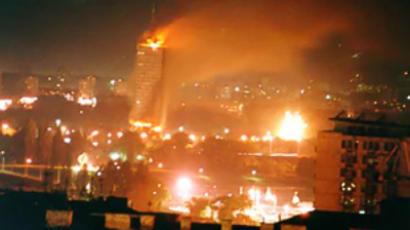Self-proclaimed Transdniester state celebrates 20th anniversary
The self-proclaimed Republic of Transdniester, a breakaway territory in the Republic of Moldova, is celebrating the 20th anniversary of its de facto independence.
The city of Tiraspol, its capital, is holding a military parade to symbolize the might of the republic. The day will end up with colorful fireworks to celebrate the occasion.
On September 2, 1990, the tiny strip of land between the Dniester River and the Ukrainian border announced its secession.
It was followed by a brief but bloody war that claimed hundreds of lives and ended only due to a peacekeeping mission led by the Russian Federation.
Transdniester was part of Moldova in the USSR. But Moldovan government policies discriminating against the ethnic Russian community – including outlawing the language – led to angry protests in the early 1900s.
As the Soviet Union started to crumble, Moldova declared sovereignty, shortly followed by Transdniester’s own declaration of independence.
Within two years the conflict had escalated into a full-scale war as when Moldovan troops tried to seize back the territory they believed to be theirs.
“Back then, it all started with words, with threats against ethnic Russians. And then came the war. For us it was a national war, and we defended our country. We weren’t invaders,” says Igor Smirnov, President of Transdniester.
The fighting, in which around 700 died in just four months, pitted ordinary civilians fighting to defend their homes and families against Moldovan troops.
Mikhail Paskar, Resident of Transdniester and former soldier recalls that “The defense of the city was conducted just by the local population. When they attacked, we didn’t even have guns to start with. Our aim was to defeat all the incoming attacks of the Moldovans and prevent their invasion, and we succeeded in that aim.”
“The first thing I did was to take my wife and two daughters away from the city. Then I returned to my defensive position near the border and started fighting. They brought tanks to try and scare us into surrendering, but their tactics only provoked a stronger defense from us,” Paskar added.
The conflict only ended when Russian forces intervened. A ceasefire was signed in July 1992. Since then an uneasy calm has been monitored by a tripartite peacekeeping force of Russian, Moldovan and local forces.
“With the help of Russian diplomats and peacekeepers we have a stable peace. If the peacekeepers weren’t here there would be far more bloodshed than there was. Nevertheless we are ready to fight to defend ourselves if we have to,” Konstantin Kushnir, resident of Transdniester and former soldier, told RT.
Russian is spoken by ethnic Ukrainians, Moldovans and Russians, with the majority in Transdniester identifying closely with Russia. While Moldova still considers the area to be its own territory, efforts to negotiate a long-term political solution continue. However, local polls show that the people of Transdniester want to determine their own future.













